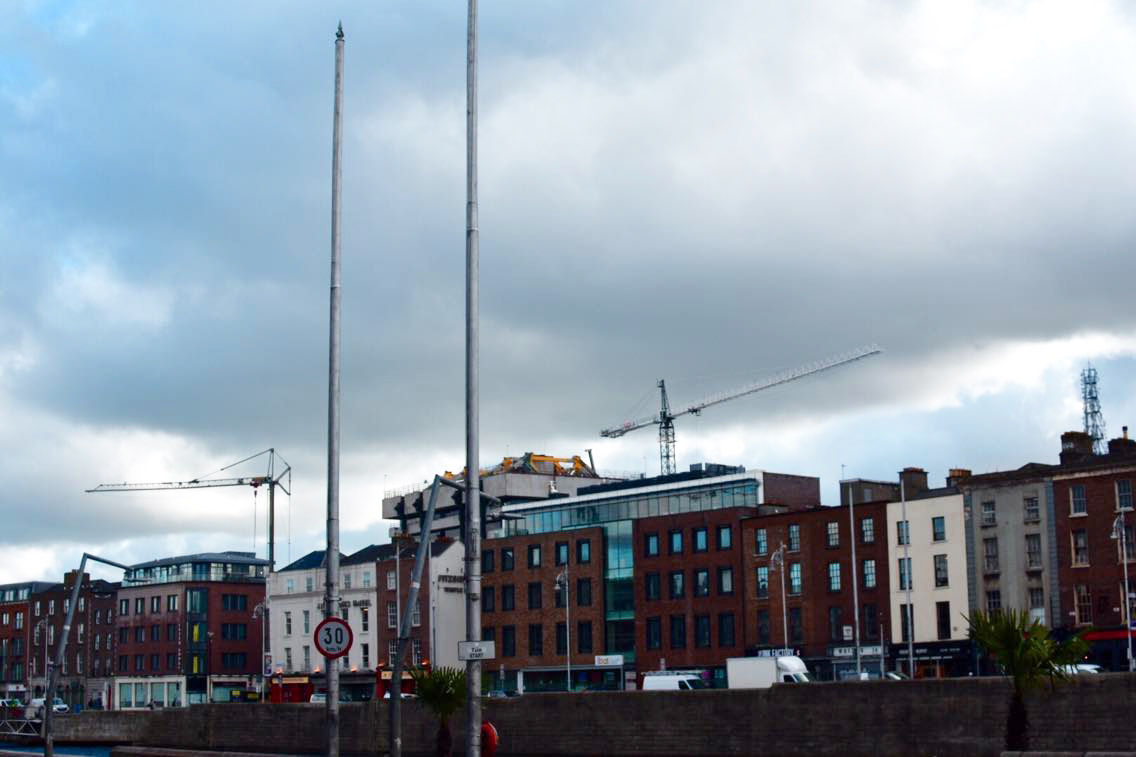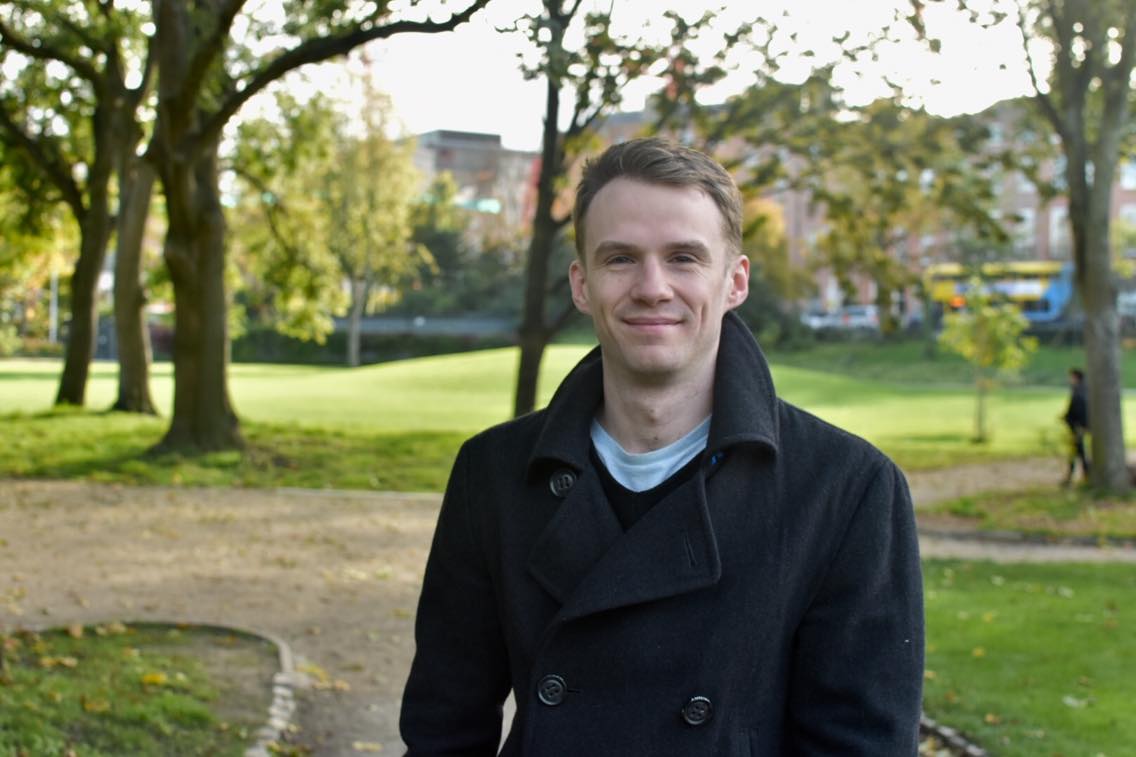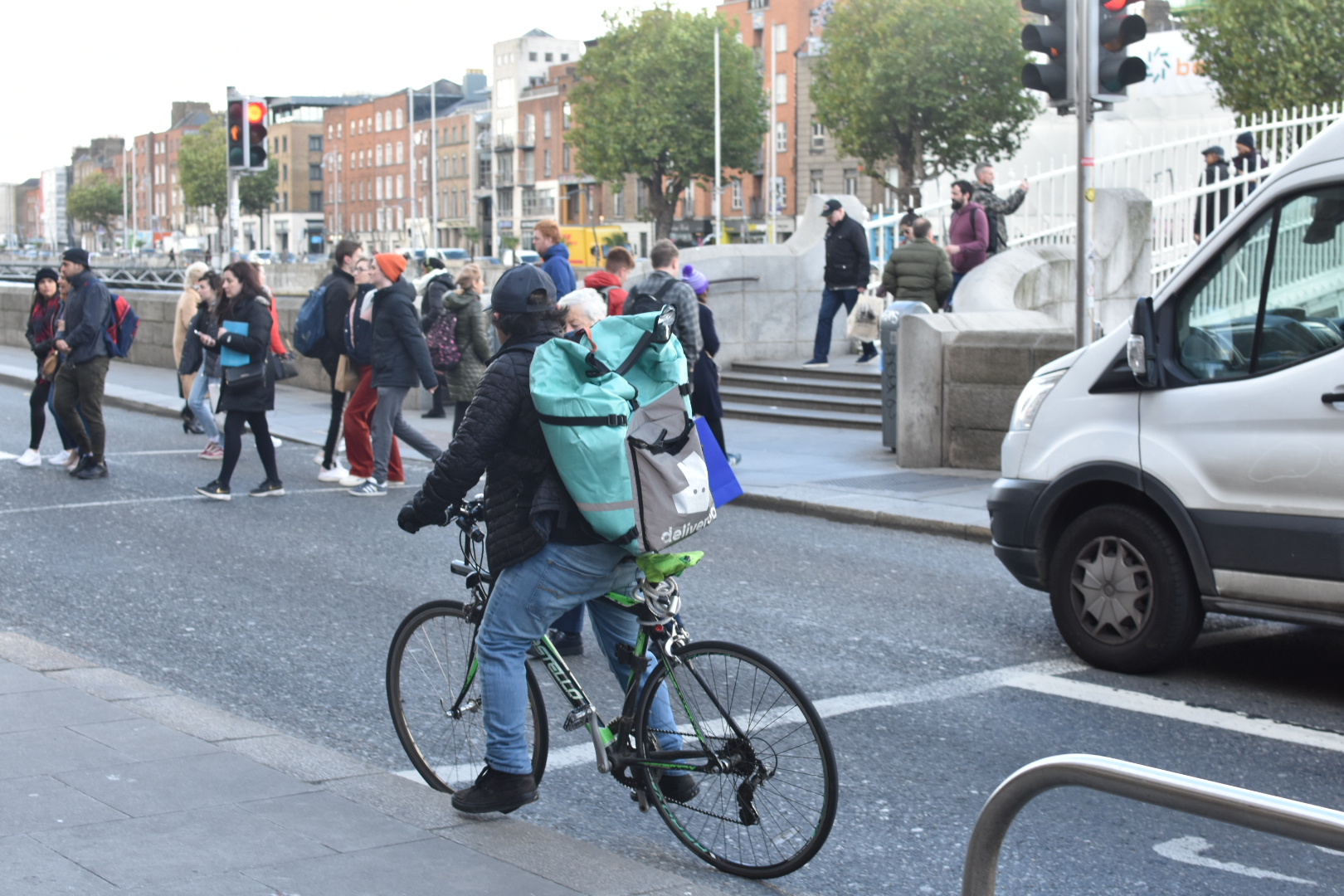I’m standing directly outside the National Lottery headquarters on Lower Abbey St, on a freezing cold October night in Dublin’s city centre. Underneath the blithe, starry logo protruding from the front of its shut offices lies a homeless man wrapped up in a worn sleeping bag. This tragic irony is not lost on the Dublin Inner City Helping Homeless (ICHH) volunteer team I’m on an outreach run with. They swiftly make up a small food bag for the man, who is sound asleep, and we continue on our rounds.
In truth, the entire night I spend volunteering with the team is full of contradictions of this sort.
It begins with the observation, made en route to meet the rest of the outreach team, that the ICHH is situated virtually adjacent to the International Finance Services Centre – the Haughey brainchild of global renown, and perhaps the most egregious symbol of Ireland’s status as a tax haven. That two vastly different organisations, with such divergent purposes, should be located in such close proximity is almost Dickensian.
This observation only hints at the counterintuitive discoveries yet to come my way over the course of the night.
As I trundle along with a kitbag filled with woolly hats, jumpers, gloves and tracksuit bottoms, along with the three far more seasoned and committed volunteers, all of the aspects of the city that usually languish in the peripheral vision come into full view. Beds made for the night in doorways of pubs and outside shopfronts reveal a world that many prefer to make invisible. As we do the rounds on our allocated Northside route, I realise that I am getting steadily worse at picking out the people who are going to sidle up to us and ask for supplies.
As we do the rounds, I realise that I am getting steadily worse at picking out the people who are going to sidle up to us and ask for supplies
Well-dressed individuals, who don’t look vulnerable, stop us to make polite enquiries about coffee and sandwiches, before expressing sincere gratitude and continuing on their way to who knows where. Their smart shoes and jeans belie the reality of their situation, as they trundle through a city dressed up with boutiques, cranes and glassily modern buildings.
These indicators of a resurgent economy convince many on the world stage that Ireland is on the rise, but this fairytale fails to match the lived experience of an increasing number on our streets – not to mention the slews of people on the breadline.
We press on down Henry St, and as we do, one volunteer named Mary tells me how “groups of Eastern European labourers used to sleep here outside the front doorway of Arnotts and get up for work the next day”. Mary has been volunteering with the ICHH for four years and has many eye-opening stories to tell. One anecdote is particularly touching: turning off Amiens St, she nods in the direction of a specific space at the top of a dark alleyway and recalls: “I used to see one man who would sleep there all the time from Mauritius. He worked in a coffee shop and his family came over to visit him. One day, his family had to go back to Mauritius and I haven’t seen him since.”
Hearing this, I think about how easily any of us can fall through the cracks, and Mary’s sage warning that “we are all just a paycheck away from becoming homeless ourselves” resonates with me anew. But it’s not the only part of the sentence that hits me: it’s also the second time the word “work” is used in the same sentence as “sleeping rough”. I wonder how this can happen – how some people’s lives can be simultaneously characterised by the chaos of sleeping rough and the ostensible regularity of a job of some description. This is a paradox beyond anything else.

Working homeless people trundle through a Dublin dressed up with boutiques, cranes and modern buildings.
But it’s not long before I see it in action. A beleaguered young woman approaches, across the road from the GPO. She seems weary and, judging from the weight of luggage she’s heaving around with her, it isn’t hard to see why. But there’s more to this young woman’s weariness. “I’ve just finished work”, she tells us. “I’ve just got my job back and I’ve to be back in work out in Blanchardstown in the morning at 9am. I don’t know where I’m going. I’ll try a hostel.” She asks if we have any warm jumpers she can take with her, and I rummage around in the kitbag. “I’ve got nothing”, she says. Another food bag changes hands and, before parting ways, Mary implores her to take care and be safe.
And so it’s confirmed to me that working homelessness is a very real and present phenomenon.
If it’s a shock to me, though, there are many who are dispiritingly well-acquainted with the idea of the working homeless. It’s even made national headlines in recent times, after Green Party Councillor for Donaghmede Lawrence Hemmings posted a photo on Twitter of a tent with a Deliveroo bag poking out of it. Chained to the railing next to the tent was the worker’s bike. In no time, the image had provoked significant public outrage and gained considerable media traction.
Hemmings included the accompanying phrase “The New Working Homeless” in his post, as a testament to the existence of an emerging class that hasn’t often gotten a hearing in mainstream political discourse, despite its increasing prevalence in developed countries.
Perhaps the company name imprinted on the bag poking out from the flap of the worker’s tent suggests that the true source of this scourge can be traced, in large part, back to the disorderly dynamics of the gig economy. It is no secret that the kind of zero-hour contract labour typically associated with this sector of the economy can send people’s lives into a tailspin. Unable to plan a fulfilling and healthy balance between work and leisure time because of the unpredictability of working hours and shifts, workers in the gig economy often live a life that’s erratic to say the least – to the point where some people’s control over their private and financial affairs becomes weakened.
Is it far-fetched to contend that these employment conditions, now widespread in the gig economy, can push those locked in their orbit onto the streets? Lawrence Hemmings doesn’t think so – and he’s got more than his photo as proof.
“What I did find after posting that tweet”, he says, “was that people internationally began sharing pictures with me of people in similar situations in London, where you can see the person’s bike is chained up and they’re literally curled up in a sleeping bag on a park bench. It’s really such a distressing sight. Really what those kind of images signified for me is that people are now being forced to live in increasingly inhospitable situations, but nevertheless still striving against it all to somehow make a home for themselves. We see tents now in Dublin everywhere from canal banks to Phoenix Park, but seeing the Deliveroo bag on this occasion really just felt to me like a symbol of a new level of chaos for people. It’s such a dangerous thing to normalise, but it is something we’re going to be seeing a lot more of, unfortunately”.
There are more children homeless now than there are adult males. So this has really started to upend the narrative around homelessnes
Hemmings says that the narrative sometimes peddled by the gig economy – of freedom and autonomy, of choosing your own hours – is bogus. “It’s so sad to see the notion of ‘flexibility’ be falsely sold as a great advantage to the worker in these cases”, he says. “Really what it means is that there is nothing guaranteed, because they’re not technically employed, they’re ‘self-employed’ – and therein lies a big part of the problem. So what we find is the absence of sick pay, holiday pay doesn’t even feature, if your bike breaks down or is in need of repair, that’s actually on you. Moreover, if business is slow on a given evening for any reason, that basically means you’re not getting paid for that shift, you’re on standby essentially. These people are earning a few quid here and there”.
This, he continues, “goes very far beyond what we’re talking about here, which is the really sharp end of it. There has been a creeping sense of self-employment sneaking into society in the last decade or so. Even big tech companies now have a really high proportion of contracted individuals – young professionals predominantly. They can be on multiple contracts before they’re offered anything permanent and have the opportunity to start a pension or access other working rights that the labour movement fought for in the past”.
It’s not hard to imagine how the combination of factors Hemmings describes can drive people into a perilous situation. In countries where the cost of living and rental markets are grossly inflated, many who work for companies like Deliveroo can fall off the ladder altogether – sometimes into homelessness.
Hemmings also points out that due to the casual nature of the work that drives companies in the gig economy, many obstacles currently prevent workers from effectively organising their labour power and creating a strategy demanding improved protections at work. “You would think this is an issue that more trade unions would be adopting”, he says.
Perhaps, then, it is the distinct lack of trade union representation in many of these atomised workplaces that is leading to the situation typified most explicitly by Hemmings’s tweet. One Deliveroo worker and member of the Brazilian Left Front, who has made great efforts to collectivise his colleagues since starting work with the company, emphatically agrees. He asks me not to mention his name in this article so as not to be identifiable to his employer, but tells me in an email that “we are just a number to the company, managed by an algorithm that tells us how and where we will do the service based on geographic location, time, and distance. We have already tried to mobilise in order to secure work improvements by going on strike, but it didn’t help. We have tried to send letters with our requests (for work improvements), but we are ignored”.
It seems clear that without the unifying strength of a trade union designed specifically for bargaining on behalf of those in the gig economy, workers’ demands for a better deal will continue to be ignored. The worker writes: “We are subject to company determinations, the savage law of Capitalism. We live in a dynamic world of time, and money, and consumers, but people do not know about the working conditions of the people that deliver them their fast-food. Since I started working with Deliveroo, the amount paid has only decreased but the demands have increased. The company wants to satisfy the customer at all costs, and sometimes the price is paid by us, the workers.”
Most chillingly, the worker gives a brief account of how pressurised and gruelling a day’s work can be for him. The “good” day, he writes, “is to get your bike and wait an hour to log in to the app (if you don’t miss the presence indicator) and pedal all day, often for 8 or 9 hours all in all. Sometimes I have found myself pedalling for 4 hours without stopping because I am forced by the system to make a delivery every hour”.

Green Party Councillor for Donaghmede Lawrence Hemmings posted a photo on Twitter of a tent with a Deliveroo bag poking out of it.
Councillor Anthony Flynn, the CEO and co-founder of ICHH, identifies the housing crisis as one of the key intersections that links the gig economy, poverty, and homelessness together. Due to the widespread nature of the crisis, he tells me that it’s about time people’s perceptions of homeless people began to change. “Over the past while, we would see a lot of people with some form of employment being made homeless. People coming predominantly from the private rental sector made homeless because of evictions as a result of rent increases – even students. People are having to camp out at night because they just can’t afford to get onto the rental ladder. We put out a survey asking people: ‘What’s your perception of a homeless person? Is it someone with a can in their hand? Is it someone begging? Is it someone with a needle in their arm?’ Because that’s not the reality. There are more children homeless now than there are adult males. So this has really started to upend the narrative around homelessnes.”
Flynn also maintains that deprivation and poverty are beginning to spread far further throughout society than where it is most visibly manifested on the streets. “People on zero-hour contracts are finding themselves in food poverty – people who just can’t afford to pay that food bill or put a meal on the table. We’ve got to face up to the fact that people are living in poverty. We wouldn’t be handing out food parcels to people, there wouldn’t be any need for food banks, if people weren’t experiencing food poverty. People are getting up in the morning, getting out of tents and going to wash themselves in Connolly Station. They’re going down to Brother Kevin’s and getting their breakfast. We’ve got nurses going to the Capuchin Day Centre to be fed. Someone I know works as a security guard and he has registered homeless, and he has to go to work. He goes to a hostel, and is asking me if Merchant’s Quay, which is a homeless shelter, washes clothes. People need to be outraged by this. A security guard used to be a good job, used to be good money. That’s just not the case anymore. You’re probably getting minimum wage now. We’ve got to face up to the fact that people are living in poverty.”
Flynn believes people need to open their eyes to the kind of poverty that exists in Dublin. He’s attempted to raise the issue’s visibility by organising campaigns such as Tent City – which saw members of the ICHH planting tents around the city. It’s an approach that caused a stir around the city, but Flynn says a radical approach is absolutely necessary in the fight to bring about change.
“Tent City was a visual protest”, he says. “We try to do something like this every year. We built a house last year and we put it outside the Dáil, and the house was made up of pictures of homeless children. Every year we try and do something that is visual. The year before that we mapped out a hotel room at the top of Grafton St, and basically it was the square footage of a hotel room – we put the bunk-bed in, the television, anything in a hotel room that a family would be forced into because they’ve nowhere to put them. We just left that there for the public to see and it made a lot of people ask the question: ‘What is this?’ Well, this is where people have to sleep. We might have a family of four or five in a room this size.”
With Flynn’s concluding remarks on opened eyes still reverberating in my head, I begin to dwell on the mismatch between how our city presents itself to the world and the reality of the hardship experienced by an increasingly sizeable proportion of its population. As I leave the ICHH headquarters on Amiens St and make tracks homeward to my warm bed, I look up at the Dublin skyline. I scrutinise the towering cranes looming above me and view them through another lens. Maybe the boom isn’t back at all. For many living and working among us, the struggle for fair rights and decent pay is far from over.







